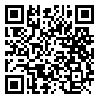Volume 14, Issue 4 (2-2021)
2021, 14(4): 51-65 |
Back to browse issues page
Download citation:
BibTeX | RIS | EndNote | Medlars | ProCite | Reference Manager | RefWorks
Send citation to:



BibTeX | RIS | EndNote | Medlars | ProCite | Reference Manager | RefWorks
Send citation to:
Akbari Zardkhaneh S, HEIDARIEHZADEH B, zanganeh A M, Mansourkiaei N, Tahmasebi Garmatani S, The glory of knowledge M et al . Short Version of the Electronic Device of the Mental Health Problems Assessment for Iranian Adolescents - Teacher Form. Research in psychological health 2021; 14 (4) :51-65
URL: http://rph.khu.ac.ir/article-1-3711-en.html
URL: http://rph.khu.ac.ir/article-1-3711-en.html
Saeed Akbari Zardkhaneh1 
 , BAHAREHALSADAT HEIDARIEHZADEH2
, BAHAREHALSADAT HEIDARIEHZADEH2 
 , Ali Mohammad Zanganeh3
, Ali Mohammad Zanganeh3 
 , Nader Mansourkiaei4
, Nader Mansourkiaei4 
 , Siamak Tahmasebi Garmatani5
, Siamak Tahmasebi Garmatani5 
 , Mohsen The glory of knowledge3
, Mohsen The glory of knowledge3 
 , Seideinollah Teimori6
, Seideinollah Teimori6 


 , BAHAREHALSADAT HEIDARIEHZADEH2
, BAHAREHALSADAT HEIDARIEHZADEH2 
 , Ali Mohammad Zanganeh3
, Ali Mohammad Zanganeh3 
 , Nader Mansourkiaei4
, Nader Mansourkiaei4 
 , Siamak Tahmasebi Garmatani5
, Siamak Tahmasebi Garmatani5 
 , Mohsen The glory of knowledge3
, Mohsen The glory of knowledge3 
 , Seideinollah Teimori6
, Seideinollah Teimori6 

1- Shahid Beheshti University , Akbari76ir@yahoo.com
2- Shahid Beheshti University
3- Judiciary Prevention Deputy, Tehran
4- Allameh Tabatabaei University
5- University of Social Welfare and Rehabilitation Sciences, Tehran
6- Azad university
2- Shahid Beheshti University
3- Judiciary Prevention Deputy, Tehran
4- Allameh Tabatabaei University
5- University of Social Welfare and Rehabilitation Sciences, Tehran
6- Azad university
Abstract: (5493 Views)
Due to the great importance of mental health students screening and lack of an appropriate native tool that was prepared based on prevalent psychopathological problems in students, the aim of this study was to provide an Short Scale-Electronic Secondary Adolescent Mental Health Problems-Teacherchr('39')s Edition.The purpose of the present study was to conduct a descriptive survey in terms of purpose of applied research. The statistical population of this study was second year high school students in Sivik province in the year 1396-97 with a total of 3761 students. Results: The results of item analysis showed that most items have the necessary conditions for tool presence. Exploratory and confirmatory factor analysis showed that the eight-item 40-item model could be considered as the most appropriate scale factor structure. Factor correlation coefficients ranged from 0.7 to 0.94, and item-to-item correlation coefficients ranged from 0.63 to 0.82. Also, the coefficients of correlation between short and long-range factors were between 0.65 and 0.97. Conclusion: It can be concluded that the resulting psychometric properties indicate the suitability of the short form of psychological health questionnaire for screening practices in the student population.
Type of Study: Research |
Subject:
Special
Received: 2020/04/14 | Accepted: 2021/11/23 | Published: 2021/12/11
Received: 2020/04/14 | Accepted: 2021/11/23 | Published: 2021/12/11
Send email to the article author
| Rights and permissions | |
 | This work is licensed under a Creative Commons Attribution-NonCommercial 4.0 International License. |



